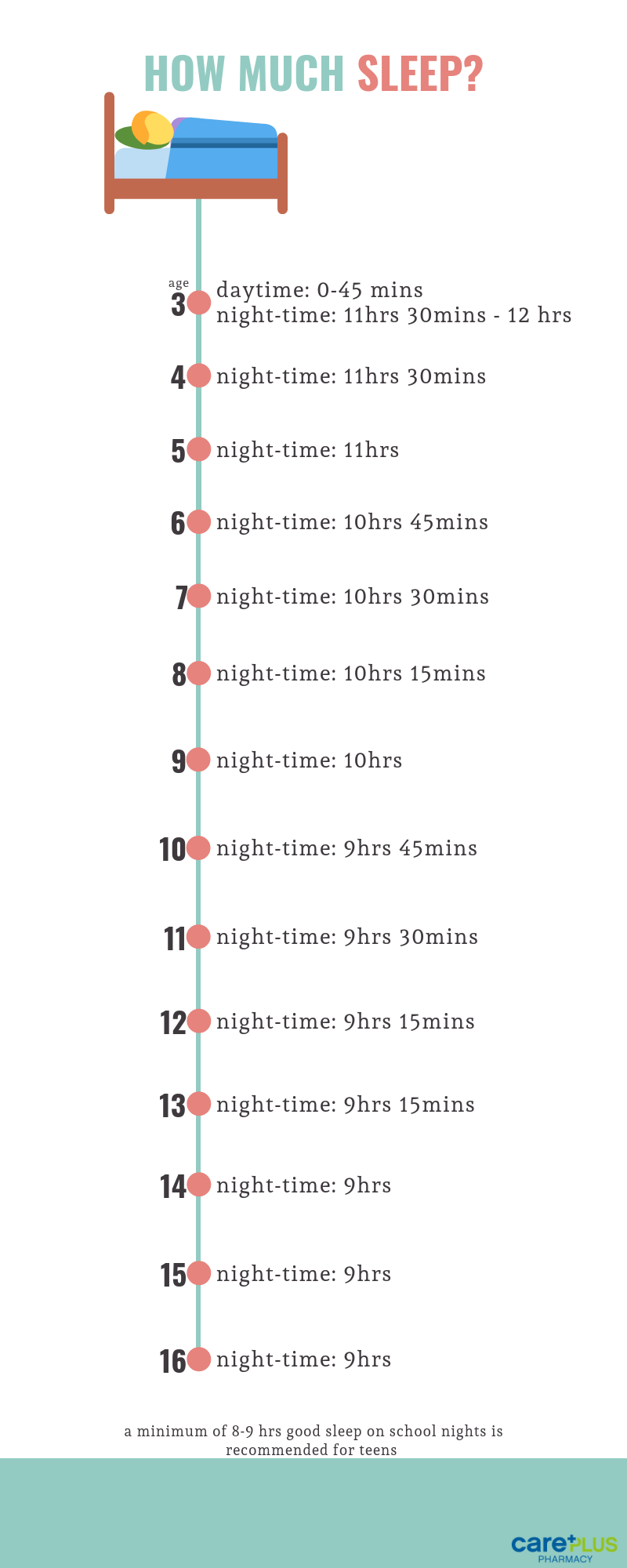During the school holidays, it is normal and expected that sleep schedules go awry. Strict sleeping and waking times turn into long lie-ins and late nights. However, as back to school season kicks in, it is important to get your children/teens to start sticking to a routine again.
Dr Michael Strunc, a paediatric neurologist and sleep specialist in the UK says that we don’t always give sleep the proper place that it’s due in terms of importance in everyday life.
Why is sleep so important?
Every human being needs sleep, some more than others. The brain and the body both need sleep. When we are asleep, it is the time when muscles, bone and skin can grow and when the body repairs injuries. Thus, good sleep is vital for your child’s mental and physical health.
Why do we sleep?
We sleep at night-time because darkness prompts the brain to produce a chemical called melatonin, which makes us sleepy. The brain decreases melatonin production in the early hours of the morning as it starts to get bright again, helping us to wake up.
Not getting sufficient amounts of sleep can have disastrous results. It can affect memory and brain function, weaken immunity and lead to depression. As we age, lack of sufficient sleep can cause weight gain, raise the risk of diabetes and harm the heart, among other health issues.
How much sleep?
The amount of sleep that children need per day depends on their age – ranging from 16 hours for a new-born (what bliss) to 9.5 hours for a typical secondary school student.
Puberty, for example, brings about a change in the body’s circadian rhythm, often causing pre-teens to not feel sleepy as early in the morning as they did as children. However, it is still crucial for pre-teens and teens to get adequate amounts of sleep in order for them to concentrate and function during the day.

Learning good sleep practices:
Children & Teens
- First of all - figure out how much sleep your child should get by referring to the above chart and work out what time that means they need to head to bed.
- About an hour before bedtime, all technology should be switched off. Flickering lights from the TV and blue light from screens stimulate the brain. White noise (such as a fan or soft music) can help reinforce a calm atmosphere until it’s time to drift off to sleep.
- Limit screens in the bedroom. Try to keep your child or teen’s bedroom a screen-free zone. If possible, don't have a mobile, tablet, TV or computer in the bedroom at night, as the blue light from the screen interferes with sleep. Having screens in the bedroom also means your teen is more likely to stay up late interacting with friends on social media. Encourage your teenager to have at least 30 minutes of screen-free time before going to sleep.
- Interact with your child at bedtime. Don’t let a TV, video or a computer take your place. Talk to your teenager or child about anything they're worried about. This will help them to put their problems into perspective and sleep better. Encourage them to jot down their worries or make a to-do list before they go to bed. This should mean they're less likely to lie awake worrying during the night.
- Do not allow children to watch anything that is not suitable for their age. This applies during the day and at night. Be aware of images that may frighten them and hence disturb their sleep.
- Have a good routine. Doing the same relaxing things in the same order and at the same time each night helps promote good sleep. A warm bath will help your child relax and get ready for sleep. Keeping lights dim encourages your child's body to produce the sleep hormone, melatonin. Once they're in bed, encourage your child to read quietly or listen to some relaxing music, or read a story together.
- Create a sleep-friendly bedroom. Your child or teen’s bedroom should ideally be dark, cool, quiet and comfortable. Invest in thicker curtains or a blackout blind to help block out early summer mornings and light evenings. If there's noise outside, consider investing in double glazing or, for a cheaper option, pick up some earplugs.
- Get help with sleep problems. If you've tried these tips but your child or teen consistently struggles with getting to sleep or sleeping through the night, you may need more support. Speak to your GP, who may refer you to a child psychologist or another expert.
- It's official: regular exercise helps you sleep more soundly, as well as improving your general health. Children and teenagers should be aiming for at least 60 minutes of exercise every day, including aerobic activities such as fast walking and running. Exercising out in daylight will help to encourage healthy sleep patterns, too.
- Cut out caffeine. Encourage less caffeine intake – found in drinks such as cola, tea and coffee – particularly in the 4 hours before bed. Too much caffeine can hinder falling asleep and reduce the amount of deep sleep.
- Don't binge before bedtime. Teach your kids that eating too much, or too little, close to bedtime can lead to an overfull or empty stomach. This can be a cause of discomfort during the night and may prevent sleep.
- Avoid long weekend lie-ins. Encourage your teen not to sleep in for hours at weekends. Late nights and long lie-ins can disrupt your body clock and leave you with weekend "jet lag" on Monday morning.
Information adapted from the NHS, UCLA Sleep Center & The Health Journals

